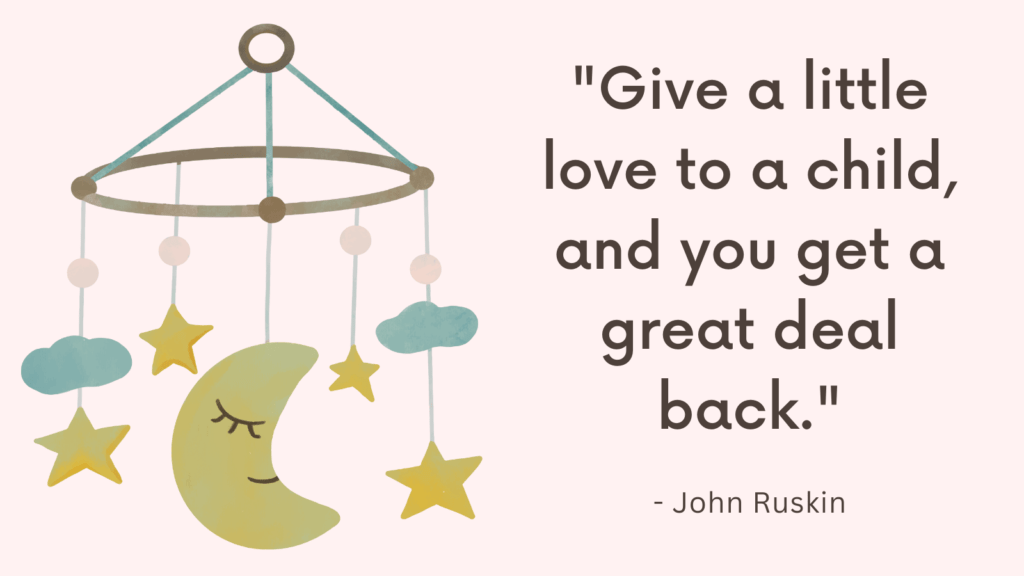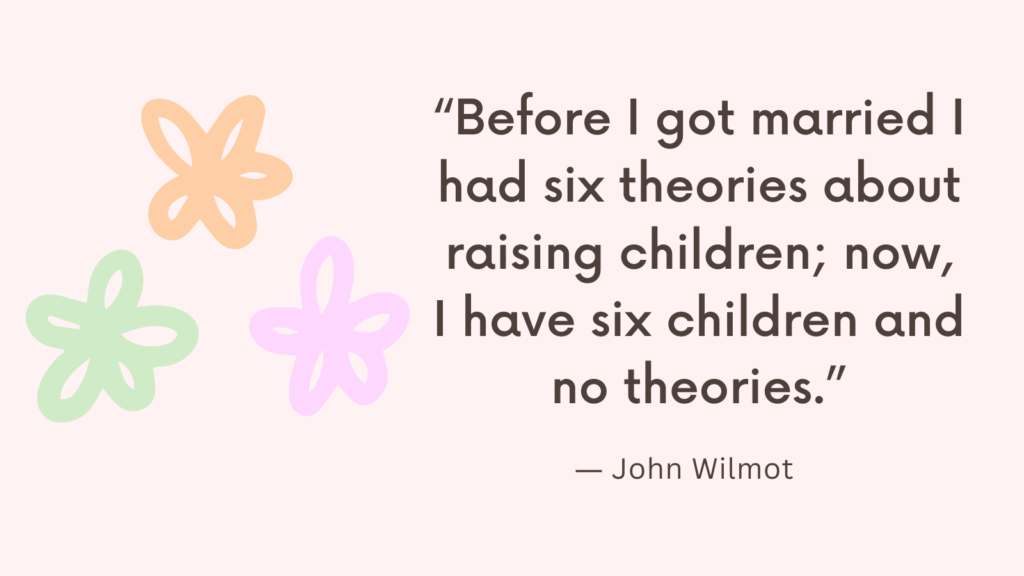This post contains 10 phrases to use when your toddler doesn’t listen along with helpful tips to deal with this challenge.
10 Phrases To Use When Your Toddler Doesn’t Listen
When it comes to parenting, one of the most common challenges that many parents face is getting their toddlers to listen.
It can be frustrating when you are trying to communicate with your child, but they seem to be in their own world.
Here are ten phrases that can help when your toddler doesn’t listen:
1. “I understand you’re feeling upset, but hitting isn’t okay.”
Acknowledging your toddler’s emotions while setting clear boundaries helps them understand that their feelings are valid, but certain behaviors are not acceptable.
2. “Let’s use our words to talk about what you need.”
Encouraging your child to express themselves verbally instead of resorting to tantrums or whining teaches them valuable communication skills.
3. “Please look at me when I’m speaking to you.”
By asking for eye contact, you ensure that your toddler is actually listening and paying attention to what you’re saying.
Related: Best 10 Books To Prepare Toddler For New Baby
4. “Can you repeat what I just said?”
This phrase helps gauge your toddler’s comprehension and allows you to clarify any misunderstandings.
5. “We have to leave in five minutes, so let’s start getting ready.”
Giving your child a specific timeframe helps them understand the concept of time and prepares them for transitions.
6. “What do you think would happen if…”
This phrase encourages critical thinking and problem-solving abilities, as your toddler considers the consequences of their actions.
Related: How To Deescalate A Child? Top 12 Tips
7. “I love watching you try new things.”
Praising their efforts, even if they don’t succeed, builds self-confidence and motivates them to keep trying.
8. “Let’s take a deep breath and calm down together.”
Teaching your toddler self-regulation techniques like deep breathing helps them manage their emotions in challenging situations.
9. “I’m always here to help you.”
Assuring your child of your support and willingness to assist them nurtures a sense of security and trust.
10. “Thank you for listening and following instructions.”
Expressing gratitude when your toddler does listen reinforces positive behavior and encourages them to continue doing so.
These phrases can create a respectful and loving environment where communication flows more smoothly.
They enable you to address your child’s emotions, teach important life skills, and establish clear expectations.
Remember to always use a calm, gentle tone and approach, as toddlers respond better when they feel respected and understood.
Related: Why Would A Child Need Occupational Therapy?
The Challenge of Parenting A Toddler Who Doesn’t Listen
Parenting a toddler who doesn’t listen can be a challenging and frustrating experience.
Toddlers, at this stage of development, are naturally curious and independent, which can make it difficult for them to follow instructions or pay attention to their parents’ requests.
It is important for parents to remember that toddlers are still learning and growing, and their ability to understand and comply with commands is limited.
For instance, when a parent tells a toddler to stop playing with their food, the child may not comprehend the reason behind it.
In such situations, it can be helpful to redirect the toddler’s attention by offering an alternative activity or explaining the consequences of their behavior in a simple and gentle manner.
Patience, consistency, and positive reinforcement play vital roles in this process.
Remember, every child is unique, and finding creative ways to engage and motivate them can make the journey of parenting a toddler who doesn’t listen more manageable.
Related: Does My Child Need Occupational Therapy Quiz
Why Toddlers Don’t Listen
There could be several reasons why toddlers sometimes don’t seem to listen:
1. Developmental stage: Toddlers are exploring the world around them and are often more focused on their own needs and desires. They may have difficulty understanding or following instructions because they are easily distracted or simply lack the language skills necessary to comprehend what is being said.
2. Attention span: Toddlers have shorter attention spans compared to older children and adults. They may become easily engrossed in their own play or interests, making it challenging for them to fully pay attention to someone else. (source) https://readykids.com.au/average-attention-span-by-age/
3. Overwhelm: Toddlers can easily become overwhelmed by too much information or too many instructions at once. They may need simple, clear, and concise directions that they can easily understand and follow.
4. Lack of motivation: If a toddler does not see the value or benefit in following an instruction, they may be less likely to do so. It’s important to provide reasons or incentives that are meaningful to them to increase their motivation.
5. Testing boundaries: As part of their development, toddlers will test boundaries and assert their independence. They may deliberately choose not to listen as a way of asserting control or testing the reactions of those around them.
Related: Is My Child Gifted Quiz
Strategies for Encouraging a Toddler to Listen
1. Get down to their level
By physically positioning yourself at the same eye level as the child, you create a sense of connection and make it easier for them to focus on what you’re saying.
This approach helps to establish a respectful and understanding environment, fostering better communication between you and the child.
For instance, instead of standing over the toddler while giving instructions, sit or crouch down so that you are closer to their height.
Additionally, maintaining eye contact while engaging with the child can further enhance your communication.
This will not only grab their attention but also demonstrate compassion, patience, and a willingness to truly listen to the toddler’s thoughts and feelings.
Related: Is My Child Highly Sensitive Quiz
2. Use clear and concise language
Toddlers are still developing their language skills, so keeping your instructions simple and easy to understand helps them comprehend and follow through.
Using short sentences and avoiding complex explanations ensures that your message remains accessible to them.
For example, saying “Please put your shoes on” instead of “Could you please find your shoes and put them on?” creates a clear instruction that a toddler can easily grasp.
Additionally, using visual cues or gestures can enhance communication and reinforce what you are saying.
Related: Best 10 Picky Eater Books
3. Use positive reinforcement
This involves rewarding your child’s good behavior and ignoring their bad behavior.
For instance, when your toddler follows your instructions or listens to you without defiance, you can positively reinforce this by offering praise or a small reward such as a sticker, high-five or a hug.
Positive reinforcement helps to increase the likelihood of your child repeating the desired behavior.
By focusing on the positive instead of the negative, your child learns that good behavior is valued and rewarded, thereby increasing their motivation to listen and follow instructions.
It’s important to note that positive reinforcement should not be overused or exaggerated, as this could lead to the child becoming dependent on rewards rather than doing the right thing out of their own initiative.
Related: Best 10 Book Ideas For Kids
4. Be consistent
Toddlers thrive on routine and predictability, so establishing clear and consistent expectations will make it easier for them to understand what is required of them.
For example, if you want your toddler to wash their hands before each meal, make sure you always remind them and guide them through the process in the same way.
Consistency also means following through with consequences, such as time-outs or loss of privileges, when necessary.
This helps toddlers understand that there are consequences for not listening, which can motivate them to pay attention and follow instructions.
Related: Best 10 Children’s Books About Self Esteem
5. Give choices
Offering options helps your toddler feel some sense of control over their decisions and encourages them to feel more invested in the outcome.
For example, instead of saying “put on your shoes,” try asking “do you want to wear your red shoes or your green shoes today?”
This approach gives the child a decision to make, which can make them feel more involved and willing to cooperate.
Additionally, providing choices can help build decision-making skills and confidence in children.
However, it’s important to keep the options limited so as not to overwhelm the child, and to ensure that both choices are acceptable outcomes.
Related: Best 8 Books For Stay At Home Mom
6. Engage in play
Play is an essential part of a child’s development and can be used as a tool to help them learn new things, including listening skills.
By playing with your toddler, you can create opportunities for them to practice following instructions, taking turns, and paying attention to others.
For example, you could play a game of hide and seek, which requires active listening and following directions.
Additionally, incorporating music into playtime can also be helpful in encouraging a child to listen and follow along with the rhythm.
Related: Best 5 Books About Foster Care
7. Keep calm and patient
Toddlers are still learning, exploring, and developing their language skills, so it’s important to remember that they may not always understand or follow instructions right away.
By maintaining a calm and patient demeanor, you create a safe and supportive environment that allows them to learn at their own pace.
Conclusion
Remember, every child is different, and what works for one child might not work for another.
Be consistent and patient, and remember that parenting is a learning process, and it’s okay to make mistakes and try again.
With practice, using these phrases can help improve communication and cooperation between you and your toddler.




